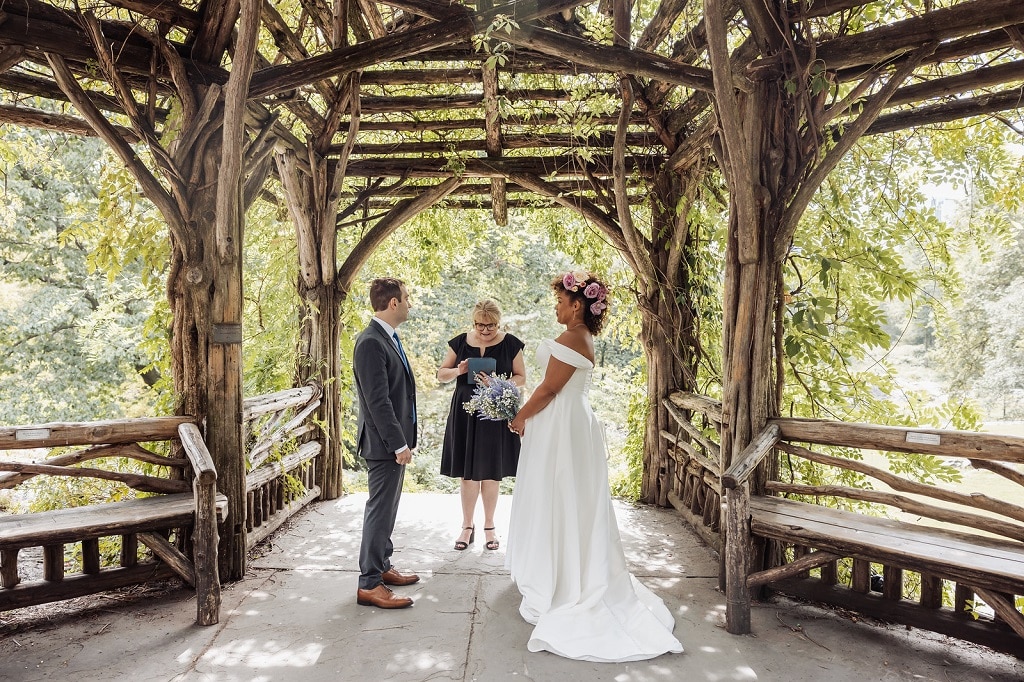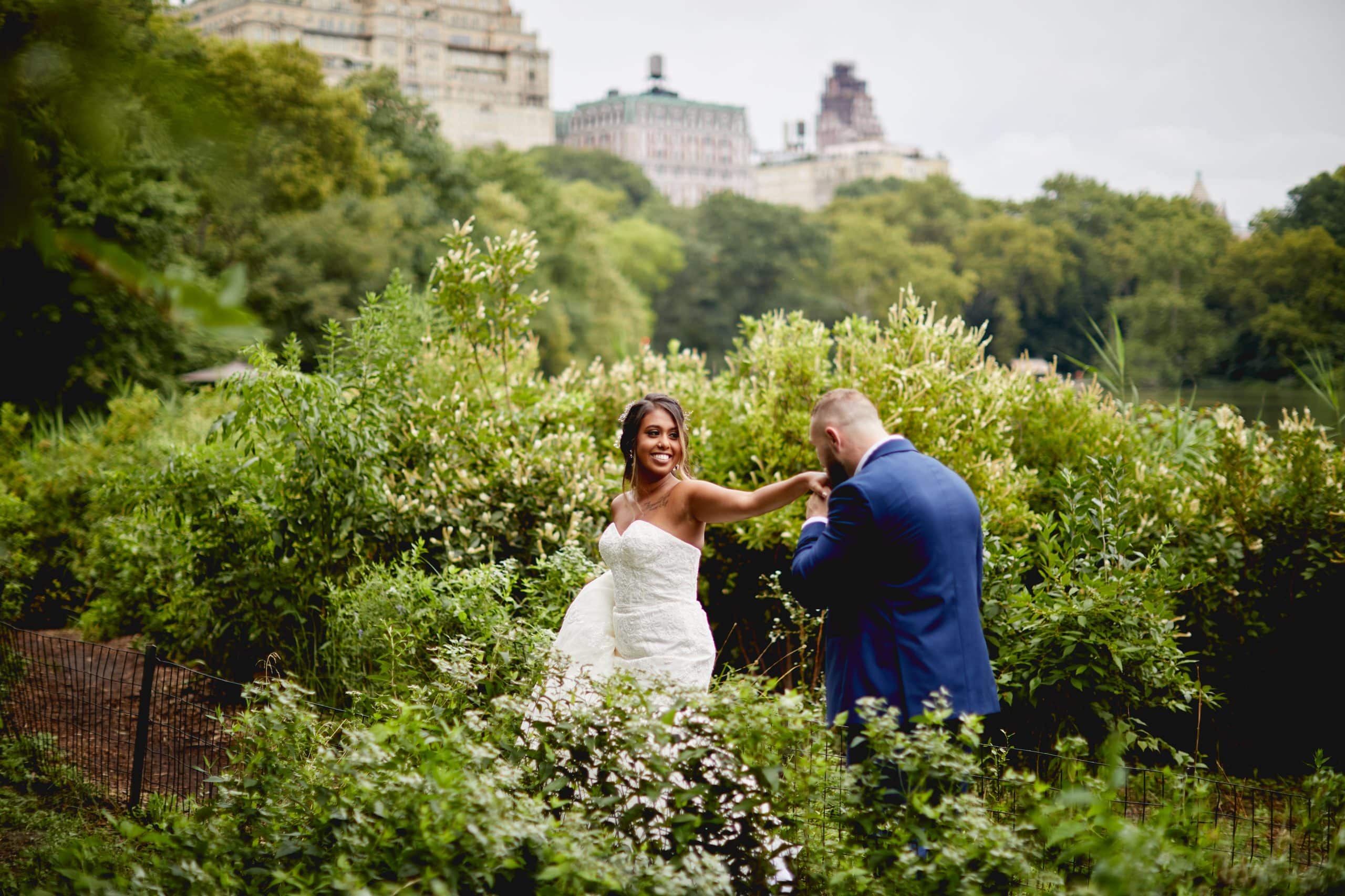What Does Elope Mean?
Elopement ceremonies stand as a reminder that love and marriage don’t need a thousand–dollar price tags. They just need people to cherish them.

Updated March 26, 2024
If you were to ask your parents what it means to elope with someone,, they might tell you something about running away to get married in secret – possibly with the words “Vegas” or “courthouse” thrown in for flavor. While eloping always seems to have an air of mystery surrounding it, its connection to the phrases “running away” and “secret” is becoming less and less applicable.
The Changing Meaning of ‘Elope”
According to the Oxford English Dictionary, the earliest use of the word “elope” was in the 14th century, when the root of the word “aloper” meant, “leap.” But by the 17th century, the term elope held a precise definition: “To run away from her husband in the company of a paramour.” While its history may sound scandalous, eloping nowadays is hardly shocking. If anything, elopement weddings are becoming increasingly common for modern couples.
So, as history progressed, the idea of eloping, and the meaning of the word changed significantly. During the Great Depression, eloping grew popular because the resources to throw a big wedding were seemingly nonexistent for most. Elopements were practical, and that’s how they got their reputation for being a cost-saving alternative to the traditional wedding. But elopements still weren’t favored in the social eye, despite their popularity and potential. During this time, elopement ceremonies were being performed solely out of necessity, not choice.

The Myths of Eloping
Let’s start bursting one by one some of the most common misconceptions surrounding elopements.
Myth # 1: No one should know that you’ll have an elopement
All this secrecy behind elopements must have come from all the drama associated with it during the old times. But this kind of marriage is no longer about two people running away, without parental consent, to get hitched behind the backs of their family members. Although it can be the case for some, most elopements don’t happen to couples with families against it. In fact, some even have their loved ones at the ceremony as their witnesses.
Myth # 2: Guests are not allowed on your special day
People often envision couples marrying this way with just an officiant and an elopement photographer with them. While this may apply to some, the modern elope definition means that you are allowed to have guests with you – the ones that you really choose to be there.
Myth # 3: Eloping will take a few hours
You don’t need to have a short and rushed ceremony. For some, this may sound ideal, but if you choose to make it longer, you are free to do so. The beauty of marrying this way is that you have more freedom in making your big day look exactly the way you’ve always dreamed it. Some even last for an entire day or even more! Unknown to most, you can schedule different daily activities to commemorate your union. It’s entirely up to you! Make sure you plan a stress-free timeline because the couple’s comfort is the priority when eloping.
Myth # 4: You don’t have to plan
Want to have a spontaneous elopement ceremony during your travels? Yes, you can do that! We even have an elopement package that you can choose from. Elopement planning may vary based on your chosen location, how you wish to exchange your vows, and the wedding traditions or post-ceremony activities you want to incorporate. Marriage, after all, is a significant commitment, and even the simplest ceremonies benefit from some forethought to ensure everything unfolds smoothly.
Myth # 5: It can only happen on a weekday
Elopement on the weekend? That seems impossible! Maybe for those marrying at the courthouse, but that’s not the only option one has when eloping. Modern elopement ceremonies offer a wide variety of ways to marry wherever and whenever you want to legally.
Myth # 6: You’re selfish for eloping
You have probably heard that a lot of couples stress out over their guest lists. This is a common problem when it comes to traditional weddings. Somehow, you’re committed to having a large wedding and are suddenly obliged to invite everyone remotely connected with you – from your relatives you barely talked to or a family friend you only see during the holidays. This is why there’s a negative connotation when you say you prefer to elope instead. Some families will go to the extent of saying that you are selfish for doing so and that you are making it all just about you. Guess what? It is all about you. Deciding to elope is all about you as a couple. And if it’s not comfortable for you to have a traditional wedding, then you don’t have to.
Myth # 7: You will save a lot of money
Well, it depends. Not all elopements are budget-friendly. Some tend to be luxurious, most especially if it’s done in an expensive travel destination. Despite that, it is still something most couples choose to do since they prefer to spend their money for them in a way they want to. Nonetheless, there is still a greater chance of saving on your wedding budget when opting to elope than the traditional way because of the limited guest count.
Myth # 8: It’s not as special as the traditional wedding
To elope has a meaning that is so special behind it. It is to celebrate your love with someone even without the presence of anybody, which makes it nothing less than a traditional wedding. Also, it’s really not the wedding that creates an extraordinary union of two people; it’s the commitment and love that they have for each other no matter what.

Eloping today
So, what does eloping mean exactly, and how do we define “elope”? Thankfully, the definition of eloping has evolved into something new, and it’s making a comeback. In fact, it’s almost synonymous with “ small destination wedding ” or “micro wedding.” If you were to ask a friend what eloping meant, they might tell you that it’s a celebration of love between two people, which often requires a fraction of the planning and budget of a traditional wedding experience. But a modern elopement wedding doesn’t sacrifice the feeling of love and celebration that some in the past would dictate it must.
The origins of elopement paint the term to be something last-minute, mostly in private or in secret. Fortunately, those preconceived notions have changed dramatically. Some benefits of eloping include less stress, less urgency, and fewer expenses, which can’t always be said for a traditional wedding. Others may want to have a private, intimate ceremony due to personal reasons. They’ve dreamed of marrying somewhere alone on a mountaintop; they don’t want to fuss over the details of a reception; they can’t justify the expenses that often come with an extensive guest list and only want their close friends or family in attendance. No matter your reasons for eloping, it’s becoming more acceptable to step away from the cookie-cutter celebration and choose something unique to your relationship.
When you simplify your wedding day, you allow space to remember what makes getting married so special the love between you and your partner. It’s a call to action to get back to the basics, but feel free to leave all that shame and guilt in the past where it belongs! Elopement ceremonies stand as a reminder that love and marriage don’t need a thousand-dollar price tag. They just need people to cherish them.

What are some elope synonyms?
The meaning of eloping is far from black-and-white, and there are many phrases that are synonymous with the word. For instance, phrases like intimate weddings, micro weddings, pop-up weddings, and even destination weddings can, at times, be used interchangeably. At the end of the day, it’s less about sticking to the rules of the origin of the word, and more about what you feel best represents your wedding day. Be true to yourself and follow the wishes of your heart! Browse through our endless elopement ideas you’ll be sure to love.




